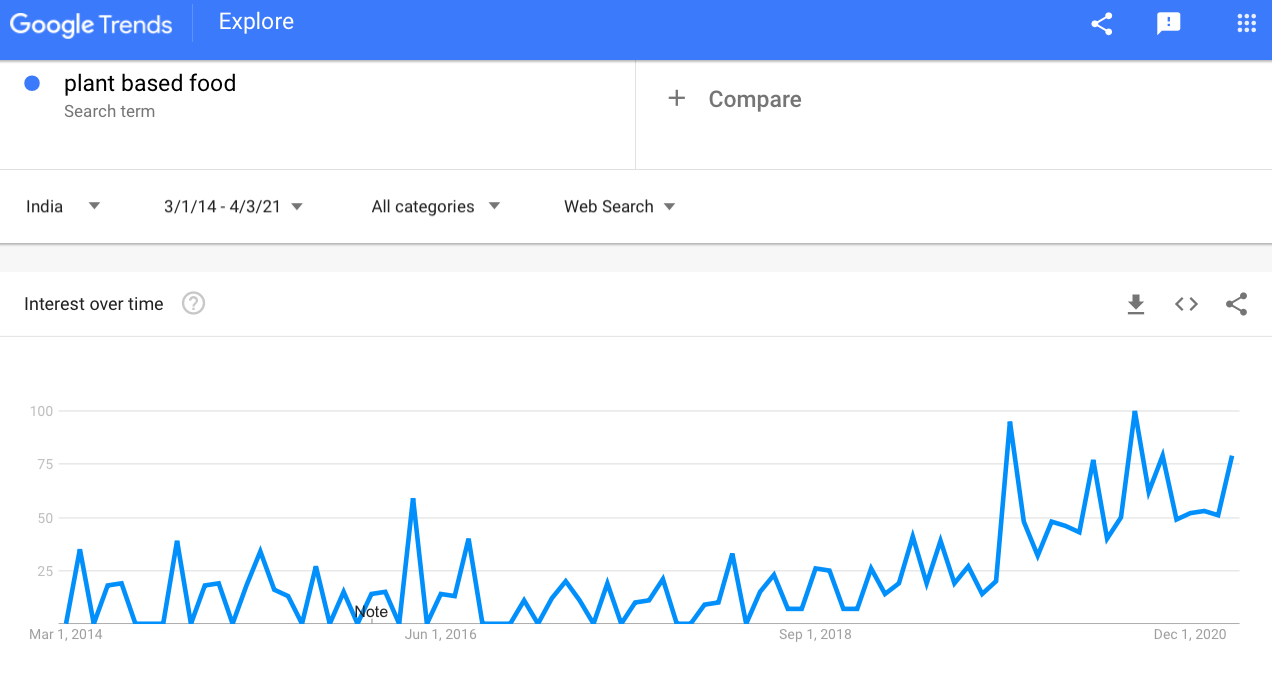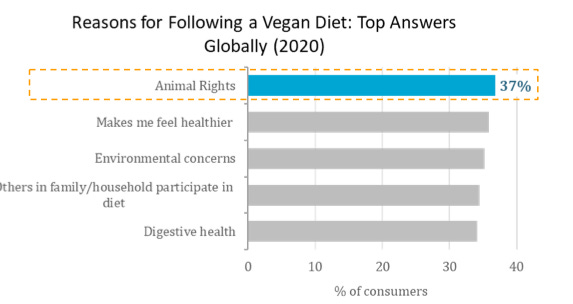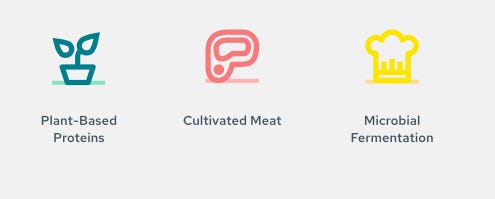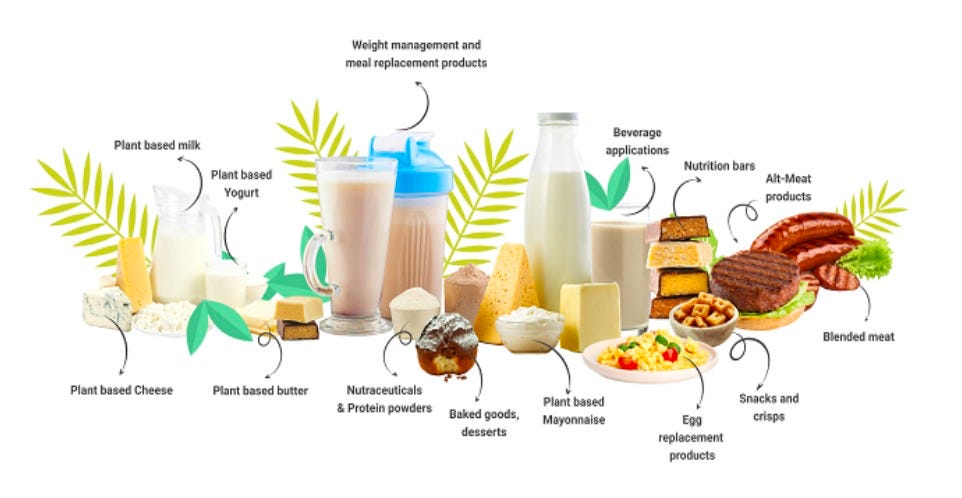In this article, we look at the trends around Plant Based Meats in India. The Indian Dream is a weekly newsletter that gives you latest Business Ideas, Opportunities and Trends direct to your inbox. Join 1,500+ other entrepreneurs looking for their next big business!
🥡 Takeaways
Milennials & Gen Z are more environmentally aware than their parents and they are leading the movement towards plant based foods around the world.
Huge market potential in India currently being served by barely 30 players.
Big brands (McDonald’s, KFC, Subway) are introducing Alt-Meats to their lineup, making the products mainstream.
The last time I ate meat was on my 19th Birthday.
My sister and I were eating chicken wings. I clearly remember feeling disgusted at myself as I bit into the wings and tore the meat from the bones and as the oil got all over my hands. My disgust for myself boiled over and I completely stopped eating meat a few days later.
12 years later and I’ve never regretted this decision. In my opinion, the environmental impact and the avoidance of animal cruelty are more important than some slight inconvenience to myself. My grandmother is still disappointed by my decision.
It’s not just me - the entire world has been moving in this direction. Beyond Meat's soy burger, Starbucks' honey oatmilk latte, Eat Just's moong bean eggs - the plant based food industry is suddenly exploding! Even India, the vegetarian capital of the world, is seeing a sudden uptick in demand for these meat alternatives.
Globally, more than 50 new players and a record-setting USD 2.8 billion investment entered plant based food space in just the last 2 years.
Plant based food is at the forefront of transforming consumer food habits in India and the world. In this newsletter, we’ll explore the business opportunities around plant based foods in India.
🧐 Market Gap
Consumers are increasingly becoming woke to the vices of animal agriculture (ill-treatment of animals, impact on environment, excessive use of antibiotics).
Animal based meat products are highly inefficient - 9 calories of food fed to a chicken gets 1 calorie back out in the form of animal flesh, the ratio is 34:1 in the case of beef!
Millenials & Gen Z care much more about the environment than older folk.
As per Euromonitor's Health and Nutrition survey 2020, around 42% of consumers globally, identify themselves as flexitarian, for the reasons:
Indian Consumers are also responding to brands that offer 'clean', healthy and ethical produce.
Ipsos MORI survey (2018): 19% of Indians identify themselves as vegans
Good Food Institute survey (2019): 63% of the Indians are likely to purchase plant-based meat regularly
This huge market in India is currently being served by barely 30 players!
Awareness about health hazards and cruelty associated with, animal agriculture (courtesy netflix documentaries and reports by NGOs like FIAPO). Zootonic diseases like Covid, Avian flu have made people more conscious about where their food comes from.
In a recent (2021) survey of why consumers are turning vegan: 46% said their motivation comes from awareness about animal cruelty, 22% (personal health), 21% (environment), 5% (curiosity), 7% (other).
These factors … leading to 'flexitarianism' (practice where meat/ dairy consumers seek to reduce their consumption levels)
💰 Market Size
The global vegan food market size was valued at USD 12.69 billion in 2018. Accordingly to Barclays the value of the global plant-based food and drink market could soar by more than 1,000 % to exceed USD 130 billion by the end of the decade.
According to Deloitte India, market for plant-based protein in India is currently valued at USD 280 million (2021).
Over the next 5-7 yrs., this market India is expected to touch USD 1 billion.
☘️ Plant Based & Alternative Meat
☘️ Plant based: For every protein compound in animal meat, one can find analog in plant kingdom.
Soy (tofu/tempeh), nuts & seeds, beans etc. are predominantly used in vegan foods.
Here is a database of > 40 plants that have potential applications in plant based foods prepared by Good Food Institute.
🥩 Clean/ Cultured meat: is created using stem cells from source animal, which are grown into meat in a bio-rector. Watch this quick video to understand the process of culturing meat.
In 2020, Eat Just (Singapore) became the first company in the world to have secured govt. approval for cultivated meat sale.
While animal & environment friendly, it's not strictly animal free.
🧀 Microbial fermentation: foods (including meat) can be created by fermenting microbes like mycelium (vegetative part of fungus - a good source of protein and other minerals). That's how Impossible Foods makes its heme based 'meat' burger.
Quorn and Prime Roots are offering meat made of fungus.
🦗 Insects: Insects are a highly nutritious food source - protein, omega-3, fatty acids in mealworms are comparable to that in fish & higher than in cattle and pigs.
United Nations's FAO issued a detailed report on prospects of edible insects as food.
☘️ Other Plant Based Foods
The proliferation of Plant Based alternatives is not limited to Meat. We’re seeing a rise of Plant based foods in other categories too.
Alt-milk and dairy: demand for plant based milk is experiencing significant surge. Soy and almond milk remain mainstream; oat, hemp, quinoa milk are slowing gaining traction.
Oat milk company Oatly filed for an IPO at ~$10 Billion valuation.
Vegan eggs, dairy alternatives like cheese (excluding milk) market are still at a nascent stage
Nutraceuticals and Protein powders: Whey (milk protein) is replaced by protein concentrate from plants like soy, pea, hemp or mushroom; fish oil replaced by seaweed for Omega-3. Read more about high protein crop ingredients here.
Sports celebrities like Virat Kohli and Lewis Hamilton are turning and promoting veganism - no longer presumed to be a nutrient deficient diet
Organic and functional F&B market is valued at more than $150 billion, vegan foods can take over significant chunk of this market - Soyent, amplefoods are prominent players.
Pet Food: Most pet food products tend to have animal deriver products in them.
The global pet food industry was worth $94 billion in 2018.
Wild Earth (vegan high protein pet food co.) got Shark Tank's Mark Cuban as investor.
Nestlé has announced launch of a new range of pet food made partly from insect protein.
Ready to cook/frozen foods: ready to eat snacks and spreads, nutrition snacks, bars and beverages, ice creams, bakery & chocolates are seeing a rise in plant based alternatives.
🥊 Players
🇮🇳 Policy & Advocacy
🥩 Plant based Meat
Gooddot - affordable products like keema paav, curries, clearly catered to mass consumer segment in India
recently raised $200,000 from New Crop Capital (Beyond Meat's investor).
Blue Tribe, Greenest - ready to cook nuggets, keema, kababs
Veggie Champ, Vegeta Gold - salami, seafood
Vezley - frozen meat
Vegolution - ready to cook tempeh cubes
🍼 Dairy
Better - creamy spreads, tofu and snacks - amazing website
Soft spot, Beyondpasse - cheese
PlantMade - egg, spreads (moong mayo, cashew butter)
Goodmylk - milk, butter, mayo, cheese
recently raised funding of $400,000
Epigamia - flavoured yogurts, milk
EvoFoods (not available for sale right now) - egg
raised funding of $360,000
Grabenord - pasta, sauces, dips
💪 Healthcare
Oziva - protein powder and nutraceuticals
raised investment of USD 17 million
Deva Nutrition - multivitamins, nutritional oils (chia, flaxseed, hemp)
Nutiva (US based)- hemp seed protein powders
🐶 Pet Food
Aistra - cat & dog food
Wild Earth (US based)
Others
🏪 Marketplace
👨🏽💼👩🏽💼 B2B Suppliers
Proeon - plant protein ingredients suitable for creating food applications (meat, dairy and other supplements)
ICL Food Speciality - functional ingredients for alt-protein foods
Richcore Lifesciences - biotech company providing protein solutions
🥩 Cultured meat (both are B2B & in prototype stage)
🙏 Our Predictions
With rise in flexitarian class of consumers, plant based foods will continue to disrupt the animal food produce industry
The percentage of "meat eaters" globally is declining, while plant based food industry saw a 264% growth by summer of 2020.
Covid 19 not only disrupted meat supply chain, it also made people more conscious of their dietary habits - plant based foods are perceived to be healthier.
Way people consume food is changing - open heaped store buffets (meat market) are giving way to single serve and convenience packaging
Plant based foods are tapping into this huge market for ready to cook/ packaged food - gaining increased shelf space and recognition#
Capital will continue to enter this market
USD 2.8 billion investment entered plant based food space in just last 2 years
Established MNC food companies like HUL, Nestle, Currie group, are moving to capitalise on the growing market through organic/ inorganic growth
More capital will lead to better production processes, scalability and lower prices
With brands like McDonald’s, Subway, KFC entering the alt-protein space, offerings will become household choices
Better awareness leads to more demand - the space will open up for even more players.
Other sources of alt-protein will gain traction from both manufacturers and buyers
Cell based meat, foods from fermenting micro-organisms (Perfect Day), some companies are now experimenting with cell based milk.
Innovation will continue in alt-protein market by way of introducing exciting food options, using less processing and healthier ingredients
Diversity in plant protein - konjac, algae, millet (not just soy and wheat)
More 'meat like' plant foods - in terms of flavour, texture and taste
🛒 Opportunities
Indian food and grocery market is sixth largest in the world - worth $250 billion (expected to reach $535 billion by 2025-2026)
Alt-food can leapfrog traditional food systems by introducing affordable, exciting and healthier meat alternatives
🌿 Explore and grow - India’s agricultural biodiversity can provide superior crops for plant based foods in terms of texture, taste, nutritional profile etc.
Most crops have not been explored - Checkout this database of >40 plants that have potential applications in plant based foods.
B2B market for supply of protein extracts and formulations used to prepare plant based foods is largely untapped in India e.g. Proeon
With increasing number of players, demand for most suitable plant proteins will accelerate.
Schouten recently brought its tempeh production system to Bangalore, India (creating income opportunity for > 2,000 local soybean farmers).
👨👨👧👦 Build Community & provide innovative offerings: Create awareness about health benefits of vegan diet and build a community, whose members can become potential buyers.
Building community aids one gain valuable insights into consumer behaviour, habits and needs - can lead to a more personalised and tailored product offering e.g. Peepal Farm
Food supply is increasingly becoming D2C - content creation, trust and community will be moat for a business
Keep the members engaged with offerings like health plan, diet consultations, subscription box, edible packaging etc.
🤝 Collaborate with existing players - Influential partnerships with major fast-food chains like Subway, McDonalds, KFC have aided disruptive emergence of many alt-protein brands into the market, by getting people excited and aware
MNC food brands are looking to enter this space and new geographies by partnering with
indigenous suppliers, players and marketplaces e.g. Starbucks-Oatley, Burger King -Impossible Foods
🍽️ Build Cloud and Clout Kitchens
Add a flavour of clout to cloud kitchens to gain popularity e.g. Sanjeev Kapoor promoting the brand with his vegan recipe book, promotion by celebs/ sports personalities who turned vegan
Celebrity couple Genelia and Ritesh Deshmukh recently announced their entrepreneurial venture on plant-based meat products
👩🏫 Consultancy - success in plant based foods hinge on selecting the most suitable ingredients and producing an end product which is appealing to consumers. Food experts can guide and assist new businesses strike this balance.
Challenges
Curiosity vs. willingness to continue eating alt-protein foods
Price parity with animal derived products.
High processing and sodium content of alt-meat, concerns around GMO soya production.
Push back from conventional food producers - e.g. challenge to the use of the word 'meat'/ 'milk' in alt-protein foods.








This is an amazing write-up
This is great work guys!